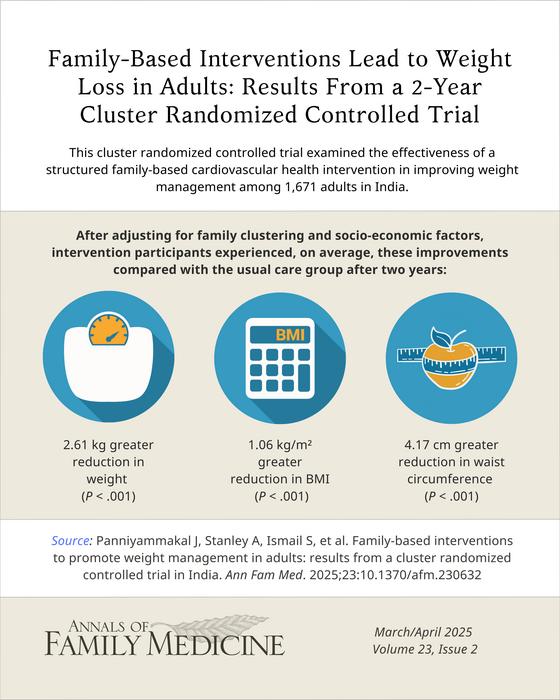Family-based lifestyle interventions have emerged as a promising strategy to combat the rising rates of obesity and related health disorders. In light of this, a significant study titled “Family-Based Lifestyle Intervention Improves Weight Management and Cardiovascular Health Among High-Risk Patients” provides compelling evidence of the efficacy of such interventions in managing weight and enhancing cardiovascular health among individuals with a genetic predisposition to early heart disease. This research is particularly relevant given the growing prevalence of lifestyle-related chronic diseases globally.
Conducted in India, the PROgramme of Lifestyle Intervention in Families for Cardiovascular risk reduction (PROLIFIC) Study focused on individuals who are at high risk due to familial history of premature coronary heart disease. The study addressed the critical link between family dynamics and health behaviors, positing that involving the entire family in lifestyle changes could yield superior outcomes compared to individual efforts. This innovative approach to health promotion could reshape community health initiatives and offer a blueprint for future programs aimed at reducing cardiovascular risks.
The design of the study was a cluster randomized controlled trial, a methodology that ensures robust results by minimizing biases through random allocation. Families participating in the study were randomly assigned to either a proactive family-based intervention group or a conventional usual care group. The intervention group benefited from ongoing, structured lifestyle counseling, delivered by trained non-physician health workers. This included regular home visits and sessions focused on setting achievable goals in diet and physical activity, as well as education about cardiovascular health. In contrast, the usual care group received only a one-off counseling session alongside annual cardiovascular risk screenings, with no ongoing support thereafter.
A total of 1,671 participants, including 1,111 women, engaged in the research, culminating in a robust dataset that examined the impacts of the family-based intervention over a period of two years. The findings of this extensive study were noteworthy. After accounting for socio-economic factors and family clustering, participants in the intervention group experienced statistically significant improvements over their counterparts in the usual care group. These included a weight reduction of 2.61 kg, a reduction in body mass index (BMI) of 1.06 kg/m², and a remarkable decrease in waist circumference of 4.17 cm, all significant at a P value of less than 0.001.
The implications of such results are profound. They suggest that family-based interventions can facilitate substantial improvements in weight management and measures of cardiovascular health among high-risk individuals, highlighting the importance of a supportive home environment in lifestyle modification efforts. This family-centric approach not only empowers individuals but also fosters a collective responsibility towards healthier living, making it potentially transformative.
Furthermore, the significance of the findings extends beyond individual health. They provide insights into public health strategies aimed at combating the escalating noncommunicable disease epidemic, particularly diabetes and heart disease. With the recognition of family as a critical influence on lifestyle choices, public health initiatives may benefit from integrating family-oriented strategies into their programs, thereby addressing health issues at the community level.
The research, led by Jeemon Panniyammakal, PhD, from the Sree Chitra Tirunal Institute for Medical Sciences and Technology in Trivandrum, Kerala, is a call to action for healthcare professionals and policymakers alike. It underscores the urgency of adopting comprehensive lifestyle intervention programs that involve families, especially for populations at risk due to hereditary factors. The findings prompt reflection on the conventional paradigms of individual-focused health recommendations, suggesting a shift toward more integrated approaches.
In conclusion, the family-based lifestyle intervention model presents a dynamic method for advancing public health, particularly in the realm of cardiovascular health management. By embracing the family as a unit in health interventions, we can harness social support mechanisms that enhance motivation and commitment to lifestyle changes. This approach not only offers a promising solution to address weight management but also embodies a holistic strategy to foster long-term health improvements within communities.
In light of the compelling evidence from the PROLIFIC study, it is essential for health authorities and practitioners to consider adopting family-based interventions as a core component of obesity and cardiovascular disease prevention strategies. Moving forward, future research should explore the sustainability of these interventions over time and their adaptability in different cultural contexts. With the rising burden of metabolic disorders, innovative approaches to health promotion, such as the one researched in this study, could pave the way for healthier futures in diverse populations around the world.
Furthermore, the need for training health workers to implement these strategies effectively cannot be overstated. Collaborative efforts among local communities, healthcare providers, and researchers are crucial to cultivate environments conducive to healthy lifestyles. Given the holistic implications of the findings, there is potential for these family-oriented interventions to serve as a model for global health initiatives aimed at improving health outcomes across demographics.
In summary, the intersection of familial involvement and health education represents a vital nexus that warrants further exploration. As we advance into an era where chronic diseases continue to rise, the integration of family-based approaches into healthcare systems is not merely beneficial; it is essential.
Subject of Research: Family-based lifestyle interventions and cardiovascular health
Article Title: Family-Based Lifestyle Intervention Improves Weight Management and Cardiovascular Health Among High-Risk Patients
News Publication Date: October 2023
Web References: https://www.annfammed.org/content/23/2/93
References: Annals of Family Medicine
Image Credits: Credit: Annals of Family Medicine
Keywords: Lifestyle interventions, cardiovascular health, obesity management, family health, community health initiatives, chronic diseases, public health.




